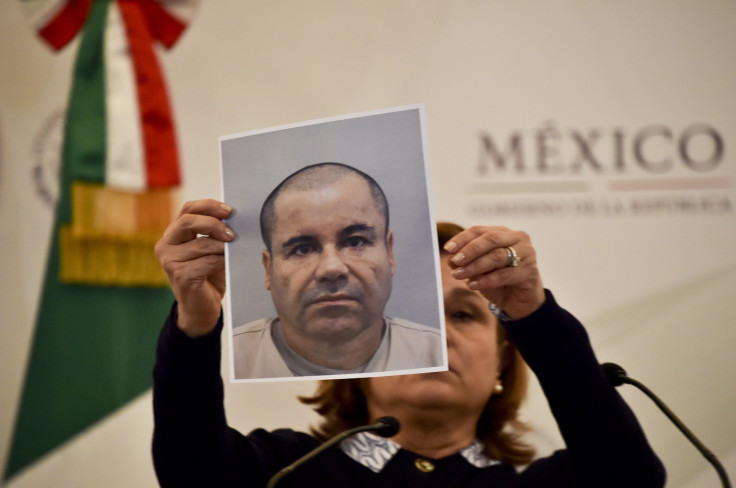Joaquin ‘El Chapo’ Guzman Update: Mexican Drug Lord Has ‘Reached His Limit’ In Prison, Wants US Extradition Sped Up

Mexican drug lord Joaquin “El Chapo” Guzman said through one of his lawyers that he is ready to plead guilty to any charges filed against him in the United States, if U.S. authorities vouch for a short sentence in a medium-security prison. Guzman, who is considered the head of the Sinaloa drug cartel, is currently being held at the maximum-security El Altiplano prison in the Mexican state of Mexico.
Guzman reportedly wants to speed up the extradition process to be free from the harsh conditions at the El Altiplano prison. His lawyer Jose Refugio Rodriguez said, according to the Associated Press (AP), that the guards at the prison were not letting him sleep, while his wife said last month in an interview that the drug-lord was “slowly being tortured” and was becoming “a zombie.” Rodriguez said Guzman — who was recaptured in January from Los Mochis in Sinaloa after escaping from the same prison last July — and his family are reviewing options for a U.S. defense attorney.
“We have talked about a proposal ... to plead guilty to the charges in the United States without questioning their veracity,” Rodriguez, who heads Guzman’s legal team said, adding: “That in exchange for a reduction in the applicable sentence like others have done in these situations, but also look for a medium-security prison so that he's not in the conditions that he has here.”
Rodriguez also said the decision to plead guilty to any charge was “an act of desperation” as Guzman had “reached his limit.”
A second lawyer for Guzman told Reuters: “Since I was able to speak to (Guzman) from Feb. 15, he said he would analyze how we could start this process. It would definitely need to be subject to an agreement with the United States.”
Previously, Guzman’s lawyers had vowed to fight his extradition as long as possible, while Mexican officials said it could take a year for the process to be completed in the country's courts. However, Rodriguez said the process could be completed in two months if Guzman withdraws the nine appeals filed by his lawyers, AP reported.
Rodriguez added, however, “We won't drop the (legal) defense in Mexico until we have an agreement with the United States,” and added that Guzman looked like a “defeated, humiliated man” during one of his visits, according to AP.
David Weinstein, a former federal prosecutor who supervised the narcotics division at the U.S. attorney's office in Miami, said, according to AP, that discussions of a possible deal are premature, and show that Guzman and his team did not understand the U.S. judicial process. He also said that any discussions of a possible deal could be done only after extradition because the U.S. Justice and State departments do not negotiate with fugitives or other wanted people who were not on American soil. He added that even if Guzman cooperated, a judge would finally decide where he would serve his sentence.
“You can't negotiate with the Bureau of Prisons,” Weinstein said, according to AP, adding: “Of all the governmental entities in the United States, they are the least flexible. Even judges can't tell them what to do with regard to placement.”
Guzman currently faces charges from seven different U.S. attorneys' offices in cities including Chicago, New York, Miami and San Diego, and authorities have so far not clarified which office would get to his case first. The U.S. Embassy in Mexico declined to comment on the pending extradition case Wednesday. Justice Department spokesman in Washington, D.C., Peter Carr, also refused to comment on the case.
The prison break in July was the second for Guzman, who had earlier escaped from another prison in 2001 by hiding in a laundry cart. He was found and arrested 13 years later.
© Copyright IBTimes 2025. All rights reserved.






















